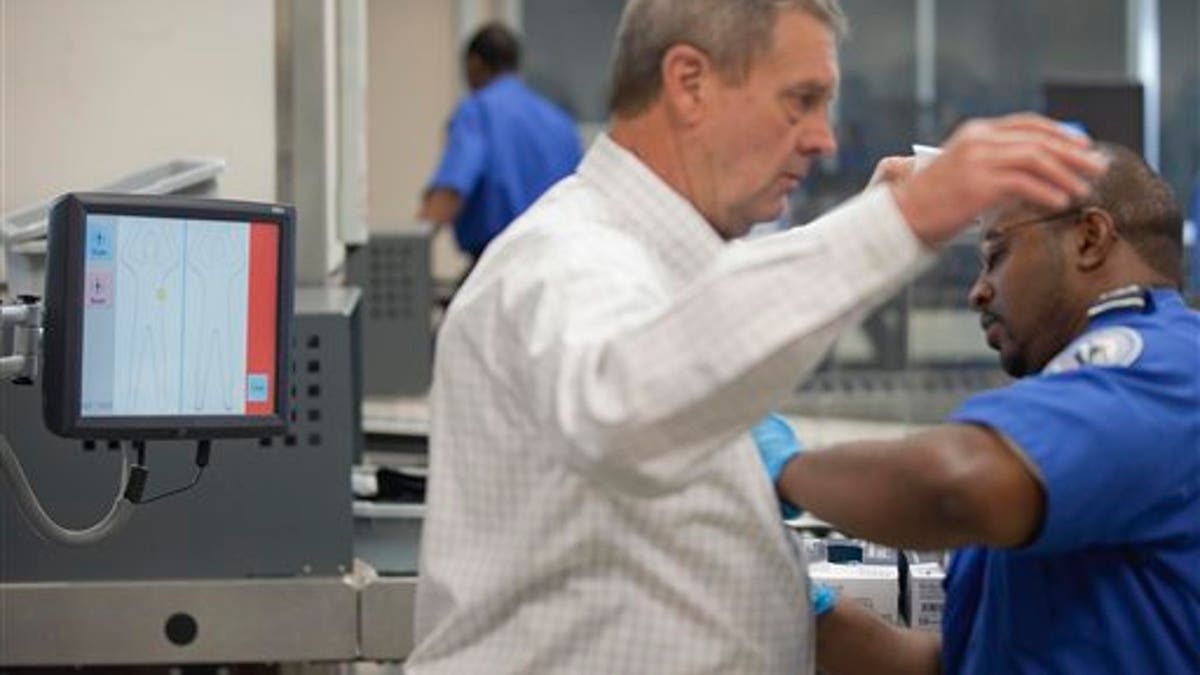
Oct. 4: A passenger is searched after going through a body scan machine at a security line at Hartsfield-Jackson International Airport in Atlanta. The Transportation Security Administration unveiled a pilot program to pre-screen a small group of select air travelers who volunteer more personal information about themselves so they can be vetted to get faster screening at airport checkpoints. (AP)
Some frequent fliers can now move through airport security without having to take off their shoes or remove their computers, liquids and gels from carryon bags.
It's part of a pilot program that the Transportation Security Administration launched today at airports in Atlanta, Dallas, Detroit and Miami. The initial trial is being rolled out to some U.S. citizens enrolled in Delta and American Airlines frequent flier programs, as well as some government "Trusted Traveler" programs, including Global Entry, SENTRI and NEXUS.
Passengers who "opt in" to provide the TSA with additional information for pre-screening, may be directed to an expedited security lane for known, low-risk travelers. The idea is to allow TSA agents to focus their scrutiny on less known or high risk passengers.
"This new screening system holds great potential to strengthen security while significantly enhancing the travel experience whenever possible for passengers," said TSA Administrator John Pistole.
According to TSA officials, agents will continue random security measures at airports to maintain a level of unpredictability. But if the "TSA PreCheck" initiative works well at the four trial airports, the agency plans to expand the program.
The system's opening run in Atlanta earned positive reviews from several of the passengers who used it, but it also illustrated that they won't be immune to all traditional security procedures. They came to the same security checkpoint as other passengers, but were ushered to a specialized line. Rodney Berry of Atlanta praised the new system even though his bag got searched by hand at the end.
"It seems like it was faster, even though I got stopped," said the 42-year-old who typically flies at least once a week.
The new PreCheck program is very small. TSA officials estimate that somewhere from 5,000 to 8,000 travelers could eventually be ushered through the specialized security lines daily. That's less than 1 percent of the average number of passengers screened daily at domestic airports. No one in the program is guaranteed an expedited screening, and the TSA says they're still subject to random and unpredictable security steps.
McLaughlin said he could not disclose for security reasons exactly how the TSA will screen passengers in the pilot program before they check in.
The government already pre-screens all U.S. passengers, typically checking their full names, birthdates and genders against government databases of potential terrorists.
But frequent-flier programs and the government traveler programs collect more data. For instance, personal information provided in Delta's frequent-flier program includes the traveler's home address, email address or phone number, and preferred language.
On Monday, the federal agency also announced it will spend $3.2 million on new technology intended to automatically spot fake government identity documents and airport boarding passes. It's expected to be tested early next year and will be incorporated into the pilot program.
Brad Childress, 59, was among the first passengers to breeze through the specialized security line in Atlanta. He set off the metal detector when he forgot to remove a money clip from his pocket, but he called the process "a piece of cake."
He wears leather loafers without shoelaces to the airport since he usually has to take them off as part of a normal security screening. On Tuesday, his shoes stayed on his feet. He said he never believed that the traditional security screening made the country safer.
"I always thought that was a false sense of security anyhow," he said.
The frequent traveler on Delta was unaware he had enrolled in the program, though airport officials say he may have authorized the airline to share his information on an electronic form without realizing it.
Childress said he would have to learn more about the information he was sharing with the government before deciding whether he objected.
"They already know where I'm traveling, they know where I live, they know what my credit card number is," he said. "So they know a lot about me."
The Associated Press contributed to this report.
